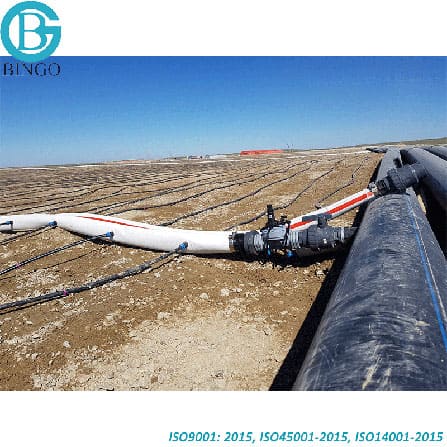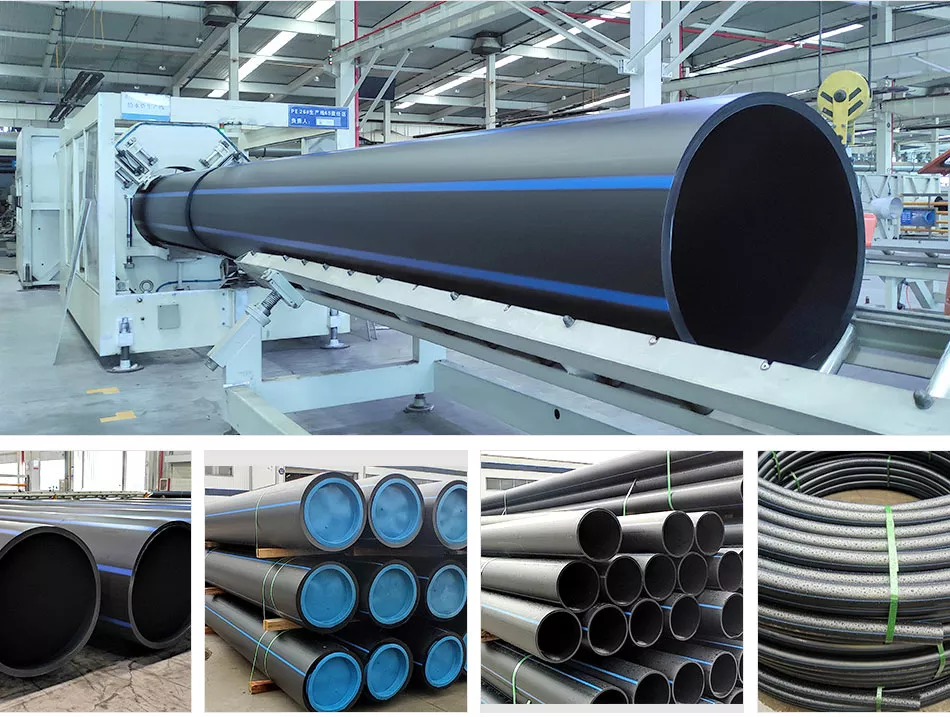A Comprehensive Overview to the Various Uses of HDPE Pipe in Building and Market
HDPE pipelines have actually become a pivotal component in contemporary building and commercial applications. Their one-of-a-kind homes, such as resistance to deterioration and light-weight design, make them appropriate for a large range of usages. From water supply systems to agricultural irrigation, HDPE pipelines offer services that enhance effectiveness and sustainability. Understanding their varied applications is vital for professionals seeking to optimize framework. What certain advantages do these pipelines offer each sector?
Water and Distribution Equipments
Water and distribution systems are crucial elements of metropolitan infrastructure, commonly counting on high-density polyethylene (HDPE) pipes for their durability and performance. These systems transport safe and clean water from therapy centers to customers, making sure accessibility and security. HDPE pipelines are favored for their resistance to rust, chemicals, and severe temperatures, which enhances their durability and lowers maintenance expenses. Additionally, their lightweight nature enables for less complicated installment and transportation, making them suitable for various city and rural applications.
The adaptability of HDPE pipes enables them to be set up in limited spaces and around challenges, decreasing the need for substantial excavation (hdpe pipe fittings Midland TX). Furthermore, their smooth interior surface decreases friction losses, enhancing water flow prices. As cities remain to expand, the need for trusted supply of water systems enhances, placing HDPE pipes as a sustainable option for modern-day infrastructure jobs. Their tried and tested track record makes them a preferred option amongst designers and urban planners alike
Wastewater Administration and Therapy
Reliable wastewater management and treatment are necessary for keeping public health and environmental high quality. HDPE pipelines play an important role in this procedure as a result of their toughness, resistance to corrosion, and capability to hold up against harsh chemicals. These pipes are generally utilized in numerous applications, including sewer system, stormwater drain, and wastewater therapy centers. Their lightweight nature helps with less complicated installation and transportation, minimizing labor prices and time.
Additionally, HDPE pipelines have a smooth interior surface area that reduces rubbing loss, advertising efficient circulation rates. They are additionally less vulnerable to leakages and failures contrasted to standard materials, guaranteeing that impurities are consisted of efficiently. Furthermore, their adaptability enables versatility in numerous soil conditions, making them ideal for varied ecological setups. As industries progressively focus on lasting methods, the usage of HDPE pipelines in wastewater monitoring systems lines up with objectives for decreasing environmental effect and enhancing source recuperation.
Agricultural Watering Solutions
In agricultural settings, effective irrigation options are essential for enhancing plant yields and managing water sources. HDPE (High-Density Polyethylene) pipelines play a crucial function in contemporary irrigation systems as a result of their sturdiness, flexibility, and resistance to deterioration. Their ability to withstand high pressures makes them ideal for both surface area and subsurface watering applications, making certain uniform water distribution throughout fields.
Farmers can make use of HDPE pipes in drip watering systems, which provide water straight to plant roots, minimizing waste and promoting healthy and balanced development. Furthermore, these pipelines are lightweight and very easy to set up, reducing labor prices and setup time. Their lengthy life-span and low upkeep needs even more boost their charm in farming methods.
Moreover, HDPE pipes are eco-friendly, as they can be reused and do not seep damaging chemicals right into the soil. This makes them a lasting option for farmers intending to adopt environmentally friendly agricultural approaches while taking full advantage of performance.
Industrial Applications and Processes
Convenience broken water pipe is a hallmark of HDPE pipes, making them indispensable in various commercial applications and procedures. These pipes are widely made use of in chemical handling industries as a result of their superb resistance to a large range of corrosive materials. HDPE's lightweight nature, incorporated with high tensile stamina, allows for very easy setup and long-term efficiency popular settings.
In the oil and gas market, HDPE pipes play a vital role in transporting hydrocarbons and gases, many thanks to their toughness and versatility - American Plastics HDPE Pipe for Oilfield. Furthermore, they are employed in mining procedures for the transportation of slurry and various other materials, where conventional piping systems might fail
HDPE pipelines are increasingly utilized in making facilities for water supply lines and wastewater monitoring. Their capability to hold up against extreme temperatures and stress makes them suitable for a selection of industrial processes. On the whole, HDPE pipes add considerably to you could check here efficiency and safety and security across varied commercial applications.
Stormwater Monitoring and Drain Solutions
Stormwater administration and drainage systems are crucial parts in metropolitan facilities, designed to handle excess rains and decrease flooding threats. High-density polyethylene (HDPE) pipes are progressively made use of in these systems due to their longevity, flexibility, and resistance to rust. These pipelines effectively move stormwater away from inhabited areas, decreasing surface overflow and avoiding waterlogging.
HDPE's lightweight nature promotes simpler installment, reducing labor prices and construction time. Furthermore, its resistance to chemicals and ecological stress factors guarantees longevity and reliability in various climates. Along with traditional drain applications, HDPE pipes are likewise utilized in ingenious services such as eco-friendly framework, which includes rain gardens and absorptive sidewalks.

Often Asked Questions
Exactly How Does HDPE Pipe Compare to PVC Pipe in Price?
Generally, HDPE pipe check my reference tends to be a lot more pricey than PVC pipe because of its enhanced sturdiness and adaptability. Nevertheless, lasting price considerations, such as upkeep and life-span, might favor HDPE in particular applications.

What Is the Life Expectancy of HDPE Pipeline Under Numerous Problems?
HDPE pipelines generally have a lifespan of 50 to 100 years, depending on ecological conditions, installation techniques, and usage. Factors such as temperature level, dirt type, and direct exposure to chemicals can substantially affect their toughness.
Can HDPE Water Lines Be Recycled After Use?
Yes, HDPE pipes can be reused after use. The recycling procedure involves thawing down the material, allowing it to be repurposed right into brand-new products, thereby advertising sustainability and minimizing environmental influence connected with plastic waste.
Are There Any Details Setup Difficulties With HDPE Pipes?
Installation obstacles with HDPE pipes include proper jointing techniques, ensuring ample trench conditions, and taking care of thermal growth. Additionally, proficient labor is needed to manage specialized devices, which can make complex the setup procedure in various atmospheres.

What Certifications Should I Seek When Investing In HDPE Pipings?
When acquiring HDPE pipelines, one ought to search for certifications such as ASTM, AASHTO, and ISO, which confirm top quality and conformity with market standards, guaranteeing resilience and performance in various applications. - Midland TX HDPE Pipe Fittings in Stock